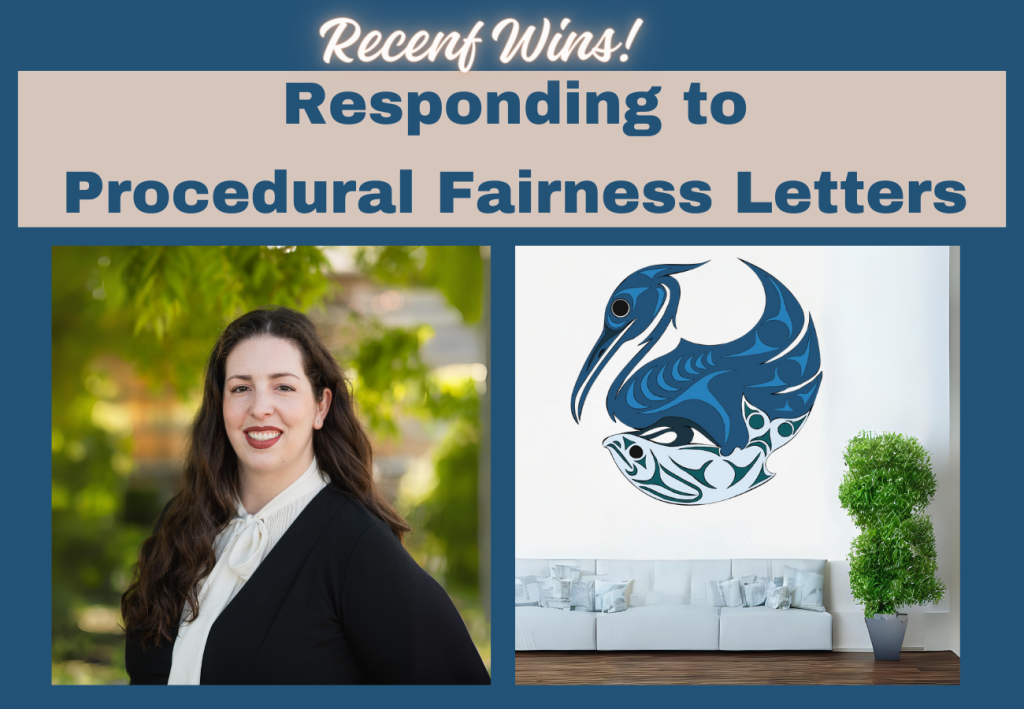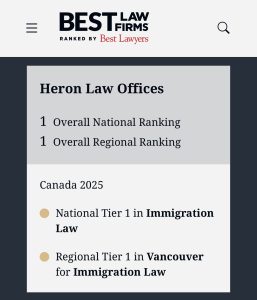
What is a Procedural Fairness Letter (PFL)?
In some cases, while a Canadian immigration application is being processed, an Applicant may receive a PFL from Immigration, Refugees and Citizenship Canada (“IRCC”). This occurs when IRCC suspects there may be a serious issue with an application. A PFL is issued so that IRCC acts in a procedurally fair manner in accordance with the principles of natural justice. These principles are engaged when an individual’s “rights, privileges or interests” are at stake as they often are when interacting with Canada’s immigration system.
Responding to a PFL
The PFL response embodies the principle that a decision maker should provide an applicant with the opportunity to know and respond to the evidence before them, which was not presented by the applicant.
It is important to prepare a clear and detailed response to a PFL in order to clarify an issue or alleviate an Officer’s concerns so that the application is not refused. In many cases, it is important to discuss the legal provisions outlined in the PFL which will likely require professional legal assistance.
PFLs are typically issued in the following situations, although this is not an exhaustive list:
- IRCC suspects an Applicant is criminally inadmissible (s 36(1) and 36(2) of the IRPA);
- IRCC suspects an Applicant is inadmissible for security reasons (s 34(1) of the IRPA) or human or international rights violations (s 35(1) of the IRPA);
- IRCC suspects an Applicant and Sponsor’s marriage, or adoption is not genuine;
- IRCC suspects and Applicant is medically inadmissible (s 38(1) of the IRPA);
- IRCC suspects that an Applicant made a misrepresentation (s 40(1) of the IRPA);
- IRCC suspects an Applicant’s dependents are inadmissible for any of the above reasons;
- IRCC suspects an Applicant provided the wrong National Occupation Classification (NOC) code or notes issues with employment letters in an Express Entry application.
Recent Successes: how hiring an immigration lawyer to respond to the PFL can make a difference
Unfortunately, often an Applicant may not appreciate the serious nature of the PFL and response. Self-represented applicants often do not provide enough information or address an Officer’s specific concerns as they relate to Canada’s immigration laws. Hiring an immigration lawyer can help an Applicant provide the best response possible. Some recent successes at our firm will demonstrate how a good response can help an Applicant achieve their desired outcome:
Addressing an Officer’s Concerns re: Examination of Non-Accompanying Dependent Child
The Applicants came to us following the issuance of a PFL related to their economic immigration PR application. The Applicants submitted their PR application self-represented after receiving an invitation to apply. Three months after submitting their application, the Applicants received two separate information requests related to the Applicant’s former spouse and non-accompanying dependent child. The Applicant’s responded without the assistance of a legal representative. A month later, the Applicants received a third request letter and a fourth request letter the following month. Six months after submitting their application, the Applicants received the PFL requesting supporting documents and a medical exam for the Applicant’s non-accompanying dependent child in accordance with section 42(1)(a) of the IRPA.
42 (1) A foreign national, other than a protected person, is inadmissible on grounds of an inadmissible family member if
- (a) their accompanying family member or, in prescribed circumstances, their non-accompanying family member is inadmissible
Our office helped the Applicant prepare a detailed affidavit outlining the important facts of the case and drafted legal submissions to help the Applicants demonstrate that they met the exception under section 23 of the IRPA because the Applicant no longer had custody of the non-accompanying dependent child and had not spoken with the ex-spouse or child in almost a decade.
23 For the purposes of paragraph 42(1)(a) of the Act, the prescribed circumstances in which the foreign national is inadmissible on grounds of an inadmissible non-accompanying family member are that:
- (b) the non-accompanying family member is
- (iii) a dependent child of the foreign national and either the foreign national or an accompanying family member of the foreign national has custody of that child or is empowered to act on behalf of that child by virtue of a court order or written agreement or by operation of law,
Four months after submitting our response, the Applicants were notified that their PR application had been approved.
Addressing an Officer’s Concerns re: Adopted Child
The Applicants came to us after their minor adoptive child received a PFL related to their temporary residence application. The Applicants were living in Canada as skilled workers and had been invited to apply for permanent residence. The Applicants’ minor adoptive child was included as a dependent on the PR application. Unfortunately, due to circumstances surrounding the COVID-19 pandemic, they were separated from their adopted child overseas. The Applicants had submitted a temporary residence application so that their child could come to Canada, and they could be reunited while the PR application was in processing. The PFL was received two years after the Applicants were nominated by their province for permanent residence. Given the importance of these applications to their family, the Applicants contacted our office for assistance in responding to the PFL. The Officer had concerns that the minor Applicant did not meet the definition of “adopted child” under the Immigration and Refugee Protection Regulations (“IRPR”).
4 (2) A foreign national shall not be considered an adopted child of a person if the adoption
- (a) was entered into primarily for the purpose of acquiring any status or privilege under the Act; or
- (b) did not create a genuine parent-child relationship.
Specifically, the Officer was concerned the adoption was entered into primarily for the purpose of acquiring immigration status and did not create a genuine parent-child relationship. In this case, we assisted the Applicants with preparing an extension request so that they could obtain the evidence needed for the response, advised them on the types of evidence needed, assisted them with preparing affidavit evidence outlining all the important facts, and prepared legal submissions to alleviate the Officer’s concerns. Two and a half months after submitting our response, the Applicants and their minor adoptive child were notified that their applications for permanent residence were accepted, and they were invited to land in Canada.
If you have received a Procedural Fairness Letter (PFL) from IRCC, contact Heron Law Offices today for guidance to help you find the best response strategy.




